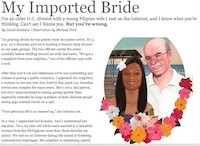
David Haldane went online, met a girl and married her. But this isn't your typical Internet-age love story. To meet this young lady in person for the first time, 63-year-old Haldane had to take a 16-hour plane ride to the Philippines, where her mother immediately inquired, “So, you want to marry my daughter.”
Haldane, a former reporter for the
Los Angeles Times who lives in Los Alamitos, penned a personal essay in this month's
Orange Coast magazine titled,
“My Imported Bride.” It details his experience finding a wife overseas and discusses “the hazards of living in Orange County with a 'mail-order bride.'” The 3,000-word piece has left some readers outraged, some nauseated and yet some defending the relationship as an example of love that prevails in spite of America's skewed notions of transnational marriage.
]
Haldane starts from the beginning. He'd been married for 15 years to an American woman his own age. They had two children together. But then he became discontent and spiraled into an affair.
I'm not proud of this, but one day I awoke to the realization that I had become the embodiment of an American stereotype: the middle-aged husband who imagines something better over the next ridge.
The next ridge happened to be across the Pacific Ocean. One night, Haldane “impulsively did an Internet search for 'Asian women' and up popped filipinaheart.com” (which redirects to filipinocupid.com, a matchmaking site featuring pages and pages of gushing testimonials from Filipino women who found Western husbands).
From there, it was game on.
It was as if I had been magically transformed from an invisible older man into a rock star whose company women craved. Of course that appealed to my ego. On a deeper level, though, it appealed to my need for stability in a world in which the love I wanted seemed impossible to find.
He adds that he understood “part of their incentive was economic” but “marriage has always had an economic component” and sometimes the reality is that “two can live better than one.”
The piece continues with Haldane meeting Ivy, a woman in her early twenties. They began to email back and forth. “I'm looking for someone who will stay with me for the rest of my life,” he confessed “barely two weeks into the talk.”
The two met in the Philippines, later married and now have a toddler. Haldane writes that he is “once again part of a happy American family” though many have raised eyebrows at their relationship. One neighbor called the cops on a garage party he was having that was attended by a large number of “dark-skinned people eating pigs roasted whole on a spit.”
We are acutely aware, of course, that others outside our group often look at us askance. We have theories as to why, but mine boils down to this: They don't consider us legitimate. In a society that values–no, practically invented–love as the only valid basis for marriage, anything even suggesting other motives is suspect.
What's troublesome about the situation isn't the age gap (though 33 years–hot damn) or the interracial nature (seriously, it's 2012, people) or even the relationship itself (it seems consensual and calculated–the courtship took two years). It's that regardless of whether this marriage is working for these two individuals, Haldane's piece (and its accompanying sidebars on topics such as “How to Handle the Bureaucracy” of transnational marriage) glorifies an industry riddled with exploitation. Sure, the author briefly notes the reality of green card marriages and the potential for abuse by American men who seek “imported” brides, but the issue deserves more than an offhanded mention.
The United Nations Office on Drugs and Crime estimates that the human-trafficking industry is the second largest criminal industry in the world, with $32 billion in annual profits. A
2011 report published in the
Virginia Journal of International Law finds that stopping exploitative practices that operate under the guise of the foreign-bride industry remains particularly challenging. According to the report, brides found through international marriage brokers are vulnerable and face high levels of domestic violence because of their “isolation, citizenship status, economic dependence, and the psychological use of her children.”
Plus, there's a general air of subtle misogyny that doesn't sit well (“Operating a washing machine and microwave were skills she had to acquire” he writes of Ivy's introduction to America). It'd be nice to hear Ivy's side of the story. As of now, it's told through Haldane,
the invisible older man turned rock star.


